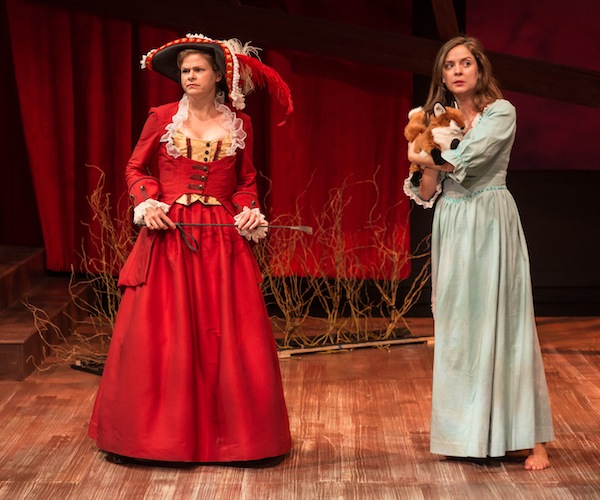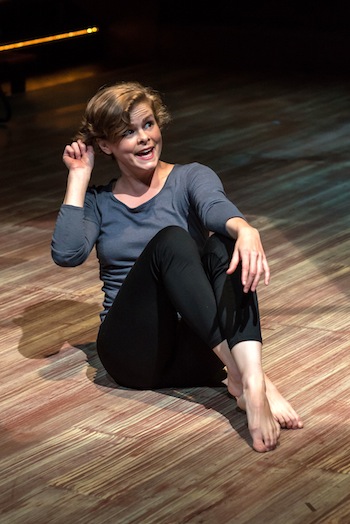Theater Review: “Her Aching Heart” — Laughing Heartily at Heterocentrism
The Nora Theatre Company’s production of Her Aching Heart has enough energy, wit, challenge, and—yes—heart to delight those who approach the rousing satire with the right spirit.

Lynn R. Guerra and Aimee Rose Ranger in the Nora Theatre Company production of “Her Aching Heart.” Photo: A.R. Sinclair.
Her Aching Heart by Bryony Lavery. Directed by Lee Mikeska Gardner. Staged by the Nora Theatre Company at the Central Square Theater, Cambridge, MA, through August 10.
By Lin Haire-Sargeant
How often do we get the chance to actually witness the cracking, battering, and toppling of a time-honored cultural monument? That’s what happens — line by line, laugh by laugh, slap by kiss — to good old heterocentrism during Nora Theatre’s two-woman comedy Her Aching Heart. If you like to thumb your nose at your grandfather’s rules, if you know your Daphne du Maurier from your Charlotte Brontë, if you would cheer seeing two Jane Austen-era heroines spin into a history-defying amorous clinch, then this play is for you.
Given recent gay rights victories, it is easy to forget that just 21 years ago, when Her Aching Heart premiered, the play’s edginess was razor sharp, its barbs at absurdity only thinly veiled by Lavery’s parody of Romantic and Gothic romance conventions. For today’s audience, laughs soften the satire, but Heart still has plenty to contribute to the ever-evolving gay critique of traditional male-female gender roles.
The time travelling story vibrates between the romance of two present-day cell-phone toting, romance-reading lesbians, Harriet (Lynn R. Guerra) and Molly (Aimee Rose Ranger); and the relationship of their Romantic era counterparts, high-born Lady Harriet Hellstone and village beauty (perhaps apprentice witch) Molly Penhallow (also played by Guerra and Ranger). The two fictional heroines meet cute when Molly disrupts the Hellstone hunt, protecting a fox (puppet) from the hounds of the hunt and Lady Harriet’s blood lust. Arguing over the fox’s fate, the women discover an inexplicable (to them) attraction along with a more understandable class-driven antipathy. As the two struggle with the love which-knows-not-how to-speak-its-name, the plot playfully submits them to the attentions of rape-inclined aristocrats and rustics, the bawdy advice of grannies and nursemaids, and the attempted rescue of a succession of pets in peril.
The modern frame story is poignant though less strikingly articulated. Harriet and Molly discover that they are reading the same lesbian romance novel, Her Aching Heart. They draw closer as they are periodically flipped into the book’s time period by ringing cellphones, costume changes, or other amusing devices.
Both Guerra as Harriet and Ranger as Molly are a treat to watch. Guerra does a remarkably convincing job of inhabiting the disciplined yet willful body of a Romantic-era aristocrat, and Ranger is delightfully plausible as a twee Wordsworthian child of nature. Still, perhaps their skills are best showcased when they quick-switch to secondary characters. Guerra undergoes an astonishing physical transformation to Granny, a witchy crone; watching the play I thought for a moment that a third actor had appeared on stage. It is delightful to be fooled so expertly; Guerra’s dance training was nowhere more apparent. Likewise, Ranger had brilliant turns as Lady Harriet’s maid Betsy, giving world-weary advice on love and men with perfect comic intonation and timing — most likely the fruits of the actor’s experience as a stand-up comic.
The Central Square Theater’s thrust-style stage is filled energetically by the actors; director Lee Mikeska Gardner (also the Nora Theatre’s new Artistic Director) uses up every inch and then some with the action as her expressively mobile characters dance, mince, strut, lurch, fence, and vamp across scenes, characters, and centuries. Steven Royal’s set, dominated by an immense multipaned window lattice skewed above the performance space, references the 18th Century, while the mirroring rectangular light projection on the floor suggests the pages of the book that the two women intermittently inhabit. The other century-spanning set piece is a brass bed on wheels that the actors adroitly spin across the boards from Molly’s cottage to Harriet’s bedroom. Costume designs for the fantasy characters are lush and enticing, with 18th-century bodices just yearning to be ripped from heaving bosoms. The modern-day costumes and props were, however, dun and drab, begging for imagination’s technicolor.
Her Aching Heart does leave an ache, but in the ear. The two actors deliver their lines at a shout. Perhaps the volume is intended to communicate parody or polemic, but I soon found the decibel fatiguing. Sonically, the music came as sweet relief, with the score by Veronica Barron flawlessly played by a four-person orchestra under the direction of Mary Bichner. Their instrumentals and occasional choral music supply witty, jazzy, lyrical punctuation to the action. In fact, the orchestra was so good that more from the musicians would have been most welcome. The vocal numbers, however, were uneven, with one delightful exception, Harriet and Molly’s tuneful duet “It’s Spring,” which closes out Act One. The modern duo discovers new hope in their new love, resolving to “read the New Yorker instead of Cosmo,” to practice yoga and to clean the dust bunnies from under their beds. Ah, fresh beginnings! Unfortunately, the other songs, though “sold” with panache, disappoint. Whether through miscalculation or accident, Ranger was pitchy at times. The singers need to modulate their delivery in line with Bichner’s unerring musicality.
In balance, this production of Her Aching Heart has enough energy, wit, challenge, and—yes—heart to delight those who approach it with the right spirit.
Lin Haire-Sargeant directs the MassArt Playwriting Workshop, which gathers Boston-area playwrights and actors together every two weeks to read and critique new work. A novelist (H.–The Story of Heathcliff’s Journey Back to Wuthering Heights) and playwright (Dead; Green Pastures), Lin is Professor of Literature and Writing at Massachusetts College of Art and Design.

